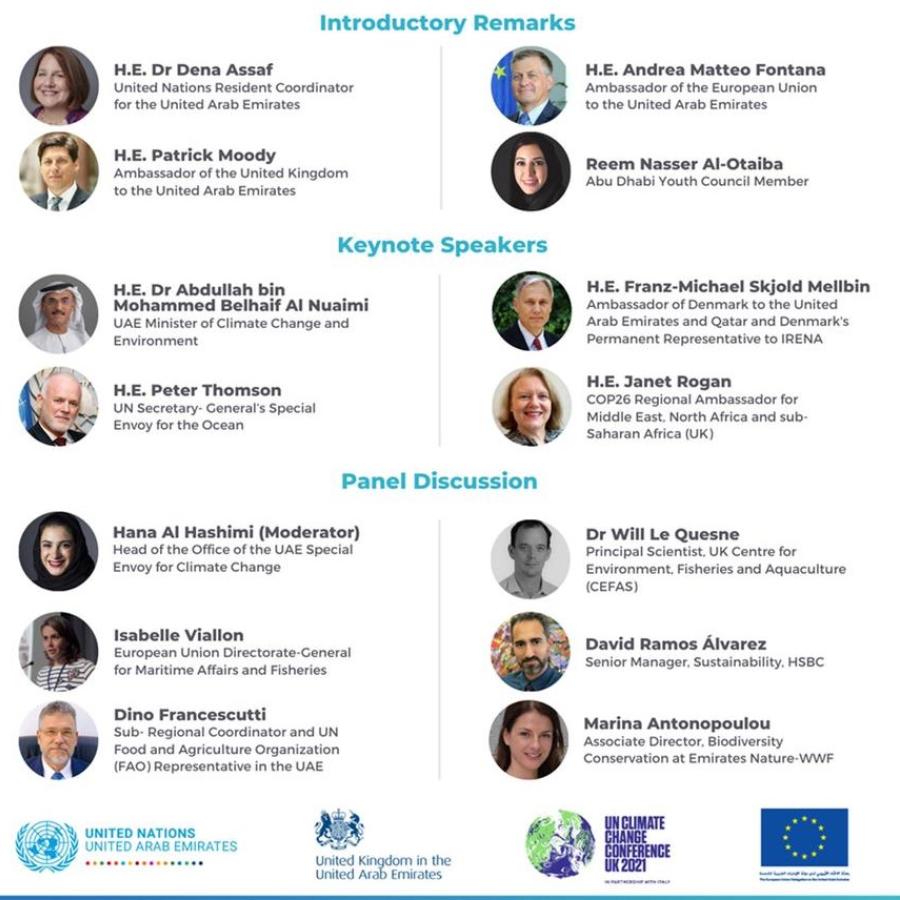Ocean Biodiversity and Climate Change
06.08.2021- Marking the 2021 World Environment Day and World Oceans Day, the UN Resident Coordinator in UAE, together with the Embassy of the United Kingdom to the UAE, the Delegation of the European Union to the United Arab Emirates and other partners, hosted a high-level virtual webinar that focused on ocean biodiversity and climate change. Over a hundred participants and representatives from the UAE including government, business, civil society and youth, the United Kingdom, the European Union, the UN, and the international community joined the dialogue whereby guest speakers reflected on the progress made on ecosystem restoration and biodiversity conservation. The audience were left inspired with key outputs and actions to be taken:
- Increase visibility for the UAE’s efforts in protecting marine areas and associated areas.
- Highlight opportunities for international cooperation under important initiatives such as 30 by 30 that aims to protect 30% of the global marine environment by 2030 in realising the decade of action for ecosystem restoration.
- Build climate resilience inline with the global dialogue leading to the COP26 planned for November 2021 in Glasgow.

The virtual webinar included remarks from the official host partners and a high-level segment with keynote speakers from the UAE and global leaders. Followed by a technical segment, engaging multi-stakeholders and subject matter experts from various sectors in a panel discussion. H.E Dr. Dena Assaf, the United Nations Resident Coordinator for the United Arab Emirates, urged the listeners to take action and bridge the climate change adaptation and resilience gaps which will make the difference in what sort of future we will all be living in. She also acknowledged the UAE’s recently updated national commitment submitted to the COP last December.
“The UAE is now working towards the ambitious target of decreasing the country’s green house gases by 23% by 2030 among other commitments. This is good news and we look forward to the UAE realizing and exceeding these commitments.” Dr. Dena Assaf, the United Nations Resident Coordinator for the United Arab Emirates
In the interactive panel discussion, the panelists addressed technical issues and actions taken by which nature-based solutions play a role in adapting to and mitigating against climate change, as well as the environmental impact in a world post COVID and the need for marine protected areas towards building climate resilience in the next Decade of Action. The Food and Agriculture Organization in the United Nations (FAO), is also working on data management and providing technical support to the UAE in sustainable fish production and consumption through innovative aquaculture techniques. Governments, corporations, civil society, and individuals can have a strong contribution and play a part in creating a circular economy for biodiversity, such as such as ecotourism, developing sustainable industrial chains, providing green mortgages and others that can help in building climate resilience and ecosystem restoration.
